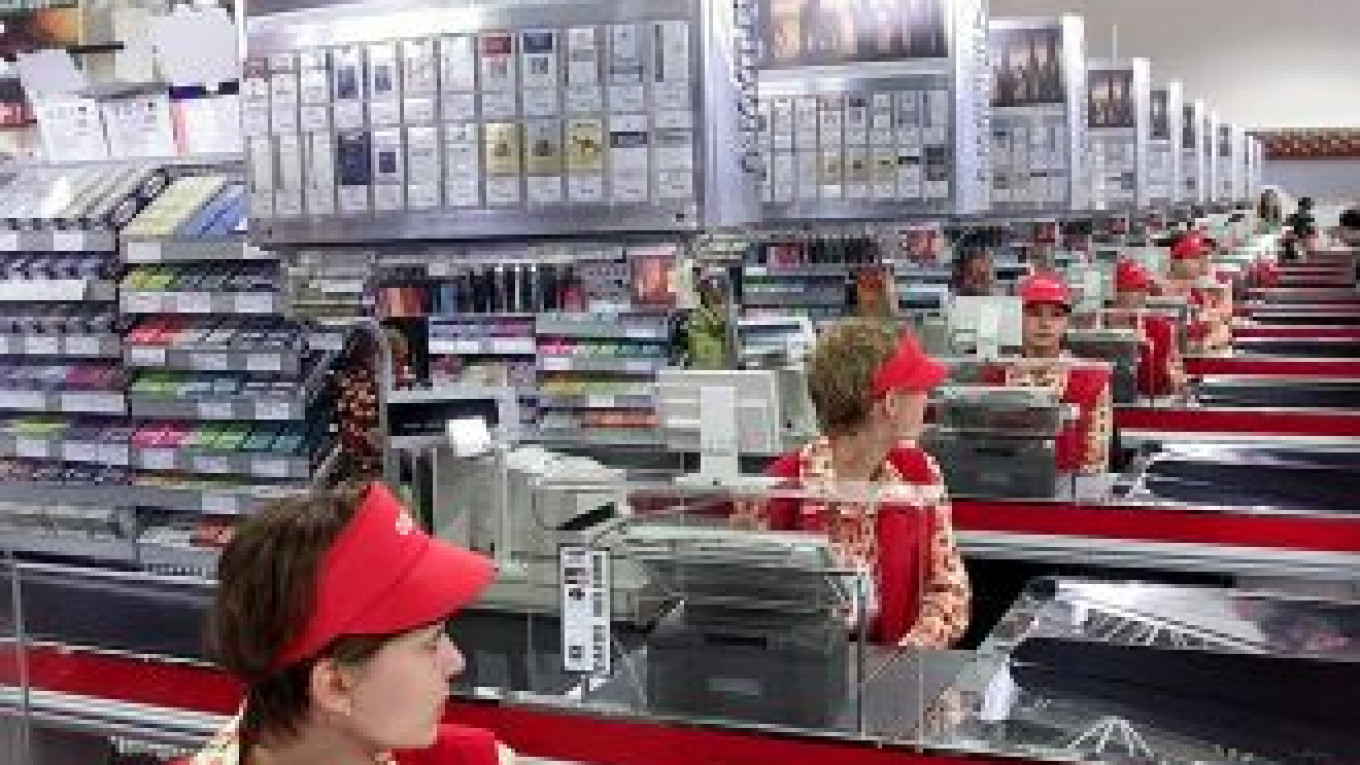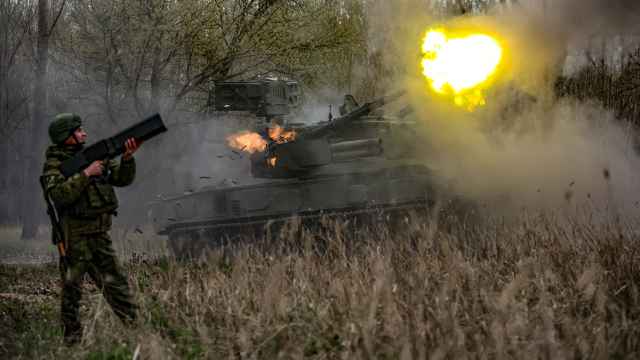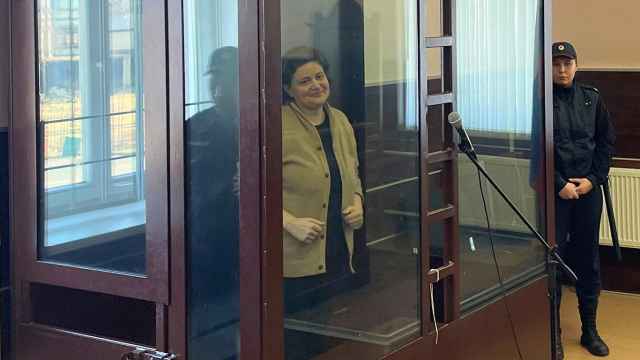The supermarket was all abuzz, with long lines at the checkout counter and more shoppers filing in — a normal scene in an emerging market — but it was after 11 p.m.
"We need more big, quality supermarkets," said Oleg Silchenko, 29, who shops at Karousel, a hypermarket chain owned by the X5 Retail Group, near his home in northwestern Moscow. He usually has to wait in a long line, especially in supermarkets with good prices and selection.
As the country emerges from the recession, the dynamic energy of the food retail business can be felt around the clock, as more and more outlets open, while food prices continue to rise.
On top of that, Russians spend roughly 30 percent of their disposable income on food because of low wages and standard of living as well as the instability of the ruble, said Maxim Klyagin, an analyst with the investment holding Finam. Americans spend less than 10 percent.
With a total turnover in 2010 of 7.1 trillion rubles ($239 billion), the retail food market is growing at 13 percent — more than twice the rate of the economy as a whole — and leading retailers are seeing growth of 30 to 40 percent.
"Supermarkets are one of Russia's greatest success stories in the last few years," said Roland Nash, chief strategist at Verno Capital.
Bigger is Better
As outdoor markets and kiosks continue to lose space, supermarkets and hypermarkets gain from their diminishing presence.
"Retail stores near them will get their customers," said Tigran Hovhannisyan, a food retail analyst with UralSib bank.
Outdoor food markets accounted for 12.8 percent of all food sales in 2009, according to the State Statistics Service. Last year's statistics are not out yet, but Klyagin said they would probably lose more market share.
Last year saw the closing of hundreds of kiosks and more are slated to shut. Mayor Sergei Sobyanin has continued his attack on kiosks after finding them too numerous in September. The newest steps in the kiosk overhaul include trade specializations and remodeling of kiosks into three design options.
Inflation Drives Growth
Deputy Economic Development Minister Andrei Klepach said last month that inflation in 2011 could be more than the projected 7 percent and that food prices will continue to grow.
"We were not able to stop rising food prices yet. There is still a big risk of a significant increase in grain prices this spring, which means that bread and meat prices will rise too," Klepach said.
The government may exercise its power to control food prices and impose maximum prices for some foods, including potatoes and other fruit and vegetables, Reuters reported in January.
Food prices rose 12.9 percent last year and 1.4 percent in January 2011, the State Statistics Service said.
Rising prices are the main driver for food retail growth. "No matter what, the people will always buy food," said Hovhannisyan.
Strength in Numbers
The X5 Retail Group, the largest food retailer, plans to open 540 new stores all over the country. Magnit, the supermarket chain with the greatest geographic coverage, is to open 800 convenience stores and 55 hypermarkets. Discount chain Dixy hopes to open 150 convenience stores in Moscow and the regions, and intends to attract customers with a new logo, more efficient operations, sales and discount cards.
This expansion will build on last year's boom, in which X5 added 1097 new stores, including 660 stores via its acquisition of competitor Kopeika. Magnit opened 827 stores, compared with 646 openings in 2009. Dixy had 646 stores open in the end of 2010, up from 623 open the previous year. With last week's purchase of rival Victoria Group supermarket chain, Dixy will own 901 stores. Sedmoi Kontinent had 146 stores at the end of the year mostly in and around Moscow, compared with 139 a year earlier.
This brings the total number of big retail chain outlets to 7,439 nationwide, or roughly 19,000 people per supermarket.
The battle for customer mindshare is heating up. X5 opened the first retail food consumer research laboratory in Russia with the ROMIR polling agency last December. Dixy is reorganizing operations to offer more efficient service, and working to decrease storage space costs by increasing turnover rates.
Food retail chains in the country offer double-digit revenue growth potential over the long term — a rate unmatched anywhere else in the world, said Hovhannisyan, of UralSib.
"The big chains can afford to keep opening more stores because they are so big," Klyagin said.
X5's net revenue for 2010 was 341.6 billion rubles ($11.2 billion). Magnit earned 7.1 billion rubles ($241 million) for the same period.
The historical trend has been equally impressive, as domestic food retail grew by 22 percent between 2002 and 2009. For comparison, the U.S. food retail market grew by 3.2 percent over the same time period, according to the UralSib report.
But the market is highly fragmented, with none of the major players having more than 4 percent share, according to UralSib.
More Consolidation Likely
The country's 10 largest food retailers hold about 11 percent of the market, while the 10 largest American grocery store chains hold about 33 percent in their market.
A consolidation trend began in 2006 when X5 was formed by the merger of supermarket chains Pyatyorochka and Perekryostok. In 2009 X5 acquired the Dutch-owned Paterson hypermarkets, and in December of last year it bought the Kopeika discount chain with its nearly 700 outlets.
As the overall consumer market continues to recover, renewed growth potential leads to even more high-profile deals in the food sector.
Dixy announced last week that it would acquire the Victoria supermarket chain for about 20 billion rubles ($680 million). Sedmoi Kontinent owner Alexander Zanadvorov bought a 15 billion ruble ($497 million) stake of the Mosmart hypermarket chain, according to reports republished on the Mosmart web site in January.
Klyagin said small domestic mergers would continue for the next few years. When companies are large enough, more foreign investment will come back.
Initial public offerings, like the one in which St. Petersburg-based O'Key Group raised $420 million in London in November, will remain a vehicle for outside investment.
But other analysts think that the time for direct foreign participation has come because of the sector's strong growth.
Although market penetration is low and the business fragmented, said Nash of Verno Capital, "the natural progression" for emerging markets is consolidation and increasing foreign investment. "Russia is big, so both will probably take place simultaneously," Nash said.
Foreign Players Limited
Metro and Auchan are the only foreign-owned food retail chains now working in the country. French-based Auchan operates more than 30 hypermarkets in Russia, while Germany's Metro operates more than 90 stores all over the country.
Shortly after X5 announced its Kopeika deal in December, the world's largest retailer, Wal-Mart, who had also tried to acquire Kopeika, closed its Moscow office.
Wal-Mart cited the lack of a suitable merger target as the reason for leaving.
"Since we have decided to enter the market through acquisition … and since there is no clear acquisition partner in the near term, there is not a business reason to continue our Moscow representative office," Doug McMillon, chief executive of Wal-Mart International, said in a statement Dec. 14.
But analysts believe that the dearth of partners is not the only reason for Wal-Mart's departure.
There is definitely an issue of scale when it comes to foreign investment in retail, but there may be another reason why Wal-Mart left, Nash said.
"They may be squeamish to invest in Russia right now," he said.
Hovhannisyan said Wal-Mart left because of a "landscape of corruption." Many American and European companies can't risk violating their own ethics codes by giving bribes, which are frequently necessary, especially during building and development.
"You can't get ahead here without corrupt practices," Hovhannisyan said.
A Message from The Moscow Times:
Dear readers,
We are facing unprecedented challenges. Russia's Prosecutor General's Office has designated The Moscow Times as an "undesirable" organization, criminalizing our work and putting our staff at risk of prosecution. This follows our earlier unjust labeling as a "foreign agent."
These actions are direct attempts to silence independent journalism in Russia. The authorities claim our work "discredits the decisions of the Russian leadership." We see things differently: we strive to provide accurate, unbiased reporting on Russia.
We, the journalists of The Moscow Times, refuse to be silenced. But to continue our work, we need your help.
Your support, no matter how small, makes a world of difference. If you can, please support us monthly starting from just $2. It's quick to set up, and every contribution makes a significant impact.
By supporting The Moscow Times, you're defending open, independent journalism in the face of repression. Thank you for standing with us.
Remind me later.






